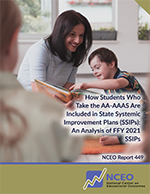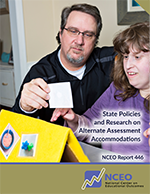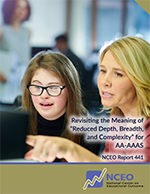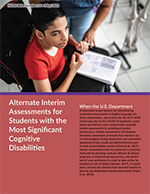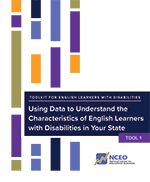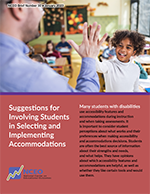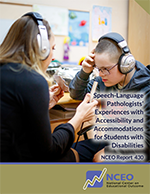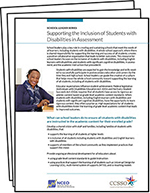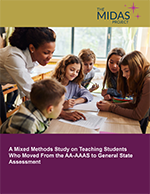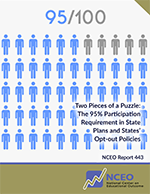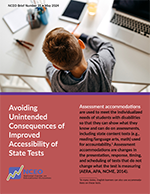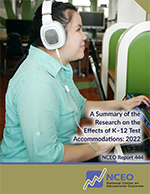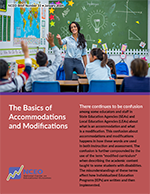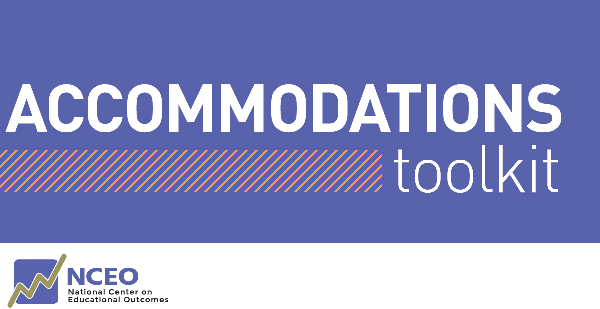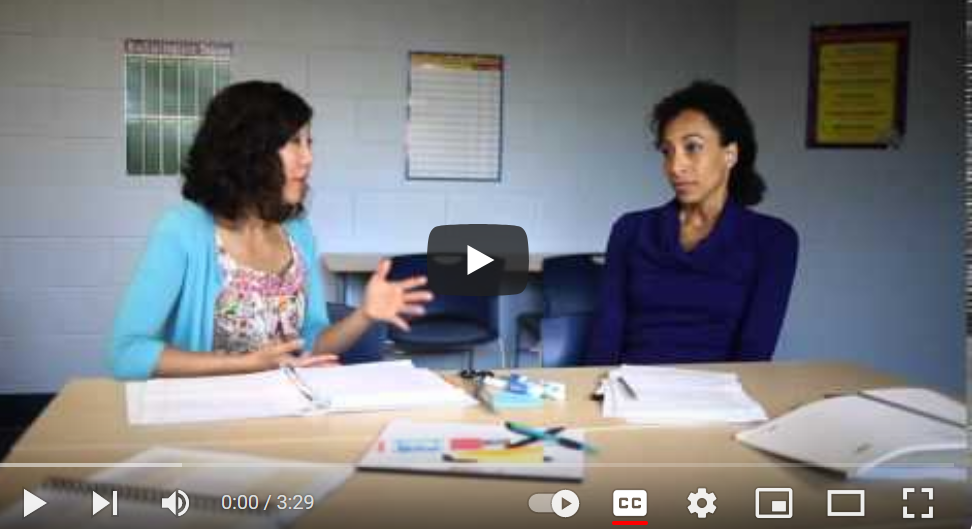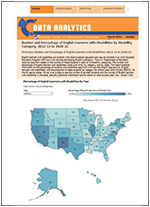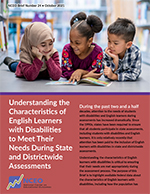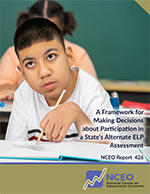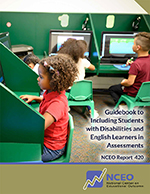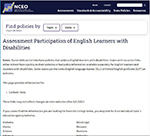Welcome
Greetings from NCEO as we slide into summer!
In this newsletter we highlight five key NCEO resources that explore various topics around the Alternate Assessment based on Alternate Academic Achievement Standards (AA-AAAS). Three of these are new resources, while the other two are popular past resources—our “In Case You Missed It” picks.
Our “New Resources” section includes:
- A guide for developing requests for proposals (RFPs) for interim assessments that include all students.
- A recent analysis on the inclusion of students who take an AA-AAAS in State Systemic Improvement Plans.
- A report that examines state policies and research on alternate assessments.
Our “In Case You Missed It” section includes:
- A report revisiting the definitions of depth, breadth, and complexity in alternate assessments.
- A resource exploring alternate interim assessments for students with the most significant cognitive disabilities.
Also, in this issue we provide information on NCEO presentations at the upcoming National Conference on Student Assessment (NCSA) and our joint forum with the Council of Chief State School Officers’ (CCSSO) Assessment, Standards, and Education of Students with Disabilities (ASES) collaborative. The Forum, titled At a Crossroads: The Intersection of AT, AAC, and AI in the Education of Diverse Learners, will follow NCSA. The Forum article includes information on how to register.
Kristi Liu and Andrew Hinkle – NCEO Co-Directors
New Resources:
Developing Requests for Proposals (RFPs) for Interim Assessments That Include All Students
State and district leaders tasked with developing requests for proposals (RFPs) for interim assessments face an important question: Are our RFPs ensuring that all students—including students with disabilities and English learners—can meaningfully demonstrate their knowledge and skills on these assessments? A new resource from NCEO provides the support you need. In NCEO Report 445, Developing Requests for Proposals (RFPs) for Interim Assessments that Include All Students, author Wesley Bruce presents clear, actionable guidance to help assessment staff develop RFPs that prioritize accessibility and inclusion from the start. The report includes sample language pulled from actual state RFPs to illustrate a variety of approaches, tailored to fit different state contexts and capacities.
How Students Who Take the AA-AAAS Are Included in State Systemic Improvement Plans (SSIPs): An Analysis of FFY 2021 SSIPs
Are students with the most significant cognitive disabilities left out of state improvement plans? A recent NCEO report, How Students Who Take the AA-AAAS are Included in State Systemic Improvement Plans (SSIPs); An Analysis of FFY 2021 SSIPs, reveals that many State Systemic Improvement Plans (SSIPs) are overlooking students participating in the Alternate Assessment based on Alternate Academic Achievement Standards (AA-AAAS).
State Policies and Research on Alternate Assessment Accommodations
Are we doing enough to support students with the most significant cognitive disabilities? A 2025 report from NCEO titled State Policies and Research on Alternate Assessment Accommodations explores this question. It sheds light on the current state of research and policy regarding accommodations for alternate assessments taken by students with the most significant cognitive disabilities. State assessment systems have included these students since 2000, but research on alternate assessment accommodations policies is lacking. Further, the clarity and consistency of accommodations policies remain varied across states.
In Case You Missed It:
Revisiting the Meaning of “Reduced Depth, Breadth, and Complexity” for AA-AAAS
As states revise or refine their alternate assessments based on alternate academic achievement standards (AA-AAAS), one question continues to surface: What exactly do we mean by “reduced depth, breadth, and complexity”? Published in 2024, NCEO Report 441, Revisiting the Meaning of “Reduced Depth, Breadth, and Complexity” for AA-AAAS, provides the clarity states continue to need on this topic. The resource reviews the historical, legal, and practical roots of these terms. It also offers key questions state education agency staff can ask to sharpen their understanding and documentation of how the AA-AAAS reflects these concepts.
Alternate Interim Assessments for Students with the Most Significant Cognitive Disabilities
Students with the most significant cognitive disabilities participate in state summative assessments by taking alternate assessments based on alternate academic achievement standards (AA-AAAS). But what happens the rest of the year? What tools do educators have to track progress, inform instruction, and make adjustments along the way? In 2021, NCEO Brief #23, Alternate Interim Assessments for Students with the Most Significant Cognitive Disabilities, highlighted a major gap in current assessment systems that still exists today: the lack of interim assessments designed specifically for students who take AA-AAAS. While general education students often benefit from interim assessments to monitor learning throughout the year, these tools are largely unavailable or inappropriate for students with the most significant cognitive disabilities.
NCEO at the National Conference on Student Assessment (NCSA)
The Council of Chief State School Officers’ (CCSSO) annual National Conference on Student Assessment (NCSA) provides an opportunity for assessment practitioners to learn and reflect upon current and emerging trends in education and educational assessments. This year’s NCSA theme will be Maximizing Impact: Leveraging Assessment and Accountability to Drive Student Learning. NCSA will take place in Denver, Colorado on June 23-25, and NCEO staff members will participate in several sessions.
Forum: At a Crossroads: The Intersection of AT, AAC, and AI in the Education of Diverse Learners
As generative Artificial Intelligence (AI), Assistive Technology (AT), and Augmentative and Alternative Communication (AAC) tools rapidly evolve and converge, they are transforming educational landscapes for diverse learners. On Wednesday, June 25, 2024, from 3:30 p.m. to 6:30 p.m., NCEO and the Council of Chief State School Officers’ (CCSSO) Assessment, Standards, and Education of Students with Disabilities (ASES) collaborative will jointly hold a forum, At a Crossroads: The Intersection of AT, AAC, and AI in the Education of Diverse Learners. This in-person forum will be held immediately following the National Conference on Student Assessment (NCSA) in Denver, Colorado.
The Center is supported through a Cooperative Agreement (#H326G210002) with the Research to Practice Division, Office of Special Education Programs, U.S. Department of Education. The Center is affiliated with the Institute on Community Integration at the College of Education and Human Development, University of Minnesota. Consistent with EDGAR §75.62, the contents of this report were developed under the Cooperative Agreement from the U.S. Department of Education, but do not necessarily represent the policy or opinions of the U.S. Department of Education or Offices within it. Readers should not assume endorsement by the federal government.
Project Officer: David Egnor


